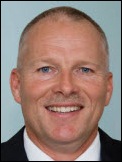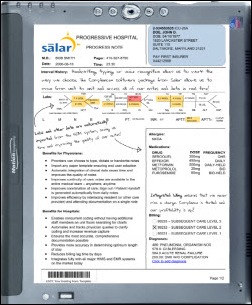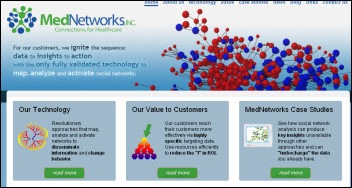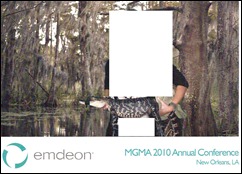There was a recent report pointing to increased Medicare costs when patients returned to traditional Medicare, of course assuming that…
News 10/29/10
From Domestic or Import?: "Re: this NEJM case study. Has Weird News Andy found this yet?” He has not. I’m sure there’s a fascinating story about how a full bottle of beer found its way into this inebriated man’s rectosigmoid colon, but I’m equally sure I’d rather not hear it.
From Man Up, MCK: “Re: most outrageous comment EVER. From the McKesson earnings call transcript, McKesson CFO Jeff Campbell claimed that nearly non-existent revenues for Horizon Enterprise Revenue Management were due to customers who aren’t buying anything except clinicals and are also pushing back their implementations (it’s the customers’ fault, in other words). He also mentions ‘new and latest requirements’ for HERM. What new requirements are causing them to basically stop all installs? The requirement that it work? I think you should ask the customers if it was really their choice to stop the installs. He said it was going to take ‘a number of quarters’ to meet those requirements — is it two, or three, or four? But the most outrageous comment ever is this: ‘… our customers are saying to us, we’re happy running that 20-year-old to 30-year-old software we bought from you 20 or 30 years ago.’ Are you kidding me? Their customers are happy to be on Star and Series, with no embedded contract engines, no professional charge billing capability, bolted-on claims scrubbing, no online bill pay, and no online registration? Customers just called up in the last few weeks to stop installs of a next-gen system that’s been touted for years and said, ‘That’s OK, we’re really happy running this old software, no rush from us?’” I actually do believe that to a certain extent – customers probably aren’t thrilled, but are used to McKesson’s deferred promises and have Meaningful Use to keep them busy short term (which will quite likely bite them long term when reform comes knocking). Also, the CFO’s reality is filtered through layers of corporate underlings like the president of the revenue cycle business they just fired, so maybe he really believed what he was told about how happy the customers are to wait and how impressive HERM will be … someday.
Listening: Atomic Tom, sounding great in the above video playing live on iPhones on the B-train of the New York subway (the video claims their instruments had been stolen, but they now admit that didn’t happen). A cool link sent by a reader, even if it does smack of an intentional viral campaign (multiple camera coverage, carefully mixed audio, and a convenient Apple tie-in).
Microsoft announces Q1 earnings after Thursday’s market close: revenue up 25%, EPS $0.62 vs. $0.40, beating estimates. The Windows, Office, and server software groups put up good numbers, while $527 million in ad revenue from the Bing search engine wasn’t much consolation for its $560 million loss. Still, these are good results and a nice bellwether for a hopefully-recovering economy.
Zynx Health announces a five-site pilot of its software and services solution that prepares hospitals for being involved in accountable care organizations. It will address clinical decision support in improving mortality rates, readmission rates, length of stay, and total costs.
Shore Memorial Hospital NJ) promotes Fred Banner from CIO to vice president, having worked his way up from PC specialist in his 20 years there.
A reader asked me if I knew of any possible candidates for a big health system corporate CIO job that requires CIO experience, but also a strong IT vision for healthcare’s future state (person-centric and involving wellness and not just care delivery). Send me your recommendations if you have any and I’ll pass them along.
University of Michigan Health System and 570 West Michigan doctors form Physicians Organization of Michigan, what they hope will be a statewide network of independent physicians. Benefits mentioned include EMRs and telemedicine.
To-dos for you: (a) drop your e-mail in the spam-proof Subscribe to Updates box to your right to get instant alerts when I post something new, allowing you to feel smug as you sprint down the hall like Paul Revere alerting everyone of some big HIT development, not because you want them to know, but because you want them to know that you knew first; (b) support HIStalk’s sponsors by checking out the ads to your left and clicking those that catch your eye as interesting; (c) Friend Inga and me or Like HIStalk on Facebook so that we can have the illusion of being BFFs; (d) make Inga happy by reading HIStalk Practice and signing up for the e-mail updates there (when Mama ain’t happy, ain’t nobody happy); (e) send me your rumors, news, and guest articles; and (f) tell people you know about HIStalk and the other sites since the ad budget is … well, zero. Thank you for reading.
Cerner just announced $65 million in quarterly profit, but it wants Kansas City to buy the computers for its new $63 million data center without charging it taxes, then lease them back to the company. That would save Cerner at least $3.7 million over 10 years even though it would create no new jobs, just the transfer of 11 existing positions from North Kansas City.
North Carolina public health agencies, free clinics, and community health centers will get broadband services from the initial phase of the NC Telehealth Network, with the $7.2 million cost paid out of a $12.1 million FCC Rural Healthcare pilot program. I couldn’t follow the confusing list of organizations, offices, and grants that were involved, so if you are really interested (I wasn’t), then you should probably read the announcement instead of relying on my impatient summary.
PinnacleHealth System (PA) chooses (warning: PDF) electronic documentation and charge capture solutions from Salar, Inc. I interviewed Todd Johnson, president of Salar, this past February. Sometimes my interviews are lame (usually because the person I’m interviewing is just not interesting or can’t quit pitching their product or themselves, so I rationalize) but this one’s good.
An investigative article from The Center for Public Integrity questions the effectiveness of having a 29-doctor AMA group recommend to CMS how much their profession should be paid for performing individual procedures. CMS accepts more than 94% of those recommendations, leading to “rubber stamp” criticism. Part of the group’s job is to deflate the times specialist groups claim it takes to the procedures they’re paid to perform. A former member of the group says specialists scratch each other’s back in the meetings, but everybody fights with the primary care docs (which the article says nearly always lose to the specialists who successfully get big payments for performing procedures). It was also noted that, even with major technology and efficiency breakthroughs, the group almost never recommends that work units be reduced.
Palomar Pomerado Health (CA) is chosen as a Pyxis development partner by CareFusion.
Sponsor jobs: HIE Team Lead, Clinical Executive Physician, Clinical Executive Nurse. On Healthcare IT Jobs: Clinical Pharmacist, Metadata Administrator, Senior Manager Healthcare Solutions Marketing, Senior Data Specialist.
Curaspan says 354 hospitals and over 2,500 nursing homes use its Web-based discharge planning, referral, ride sharing, and transportation applications.
Ingenix forms an independent physician advisory board to guide its healthcare technology direction. Among them are Joseph Heyman (who was on some Health IT Policy Committee work groups), Salvatore Volpe (president of the New York State chapter of HIMSS), Martin Harris (his ubiquity precedes him), Gregory Reicks (an osteopath who is board president of an HIE), and Alice Loveys (a CMIO).
Charleston Area Medical Center (WV) cuts $40 million from its budget due to low reimbursement, high drug costs, and $16 million worth of software upgrades. They didn’t say which systems were being upgraded, although I seem to remember that they’re a Siemens shop.
The fired CEO of 15-employee, Indianapolis-based EMR vendor iSalus Healthcare sues the company for breach of contract. Mark Day says he was fired after telling the board chair that he was suspicious that employees were stealing software. The board’s termination letter said he was let go for telling a prospect that iSalus was in trouble and warning the customer of some of the company’s untrustworthy executives, also asking the prospect for a job if things went south there (I’ll hazard a guess that they didn’t sign on the line which was dotted). Day says that conversation was misinterpreted.
Boston-based MedNetworks is developing software based on Harvard-licensed technology that maps the social networks of people and clinicians. The startup plans to sell the information to drug companies, insurance companies, hospitals, and the government. It says that the influence of friends and colleagues may be more important than formal experts when it comes to changing healthcare behaviors or getting doctors to prescribe specific drugs. One of the founders is Harvard professor Nicholas Christakis, whose social network book landed him on Time’s 2009 list of the most influential people in the world. I might have to get a copy.
HERtalk by Inga
From Za: “Re: my McKesson rep. Said that while it has not been verified, Horizon is on life support. Pretty sure this is not news other than I am gloating a bit because when I got to my current hospital, they were looking at McKesson Horizon and I told them there is no way that mess would ever work. I like being right!” Unverified and purely conjecture, we’ll quickly disclaim, but it’s coming from a hospital CIO who’s usually right.
From Trinketeer: “Re: MGMA goodies. I know you like evaluating all the vendor freebies at trade shows. I brought home a bunch of stuff for my kids. My 10-year-old remarked that it was ‘the same old stuff’ and nothing very good.” Kids say the darnedest things. I have to agree with the 10-year old, except for my souvenir photo with the alligator (redacted for anonymity, of course). It supported alligator conservation, but as I said on HIStalk Practice, all I could think of was how nice his skin would look on a pair of pumps.
I am back from New Orleans and trying to find the bottom of my e-mail inbox. If you care to know what practice administrators are talking about and what vendors and pundits are telling them, we have three days of highlights on HIStalk Practice.
While at MGMA, I had a long conversation with an Allscripts executive. One of the topics discussed was the company’s decision to discontinue upgrades to the Peak Practice EHR. While I can understand how this decision is disturbing for end users, I must admit that Allscripts seems to be trying pretty hard to reduce the pain. A bit of background if you haven’t been following the story: Peak Practice is an EHR that Allscripts acquired in the Eclipsys purchase, which Eclipsys had acquired from developer Bond Medical. Apparently the Peak product has a number of functionality gaps and only 300 users. Allscripts has applied to have it ONC certified and won’t sunset it per se, but they won’t be releasing enhancements to it, either. They’ll offer Peak users free like-for-like MyWay licenses and perform the data conversion at no charge. Change is difficult, but I can’t fault Allscripts for making what is probably a good business decision and I commend the company for trying to make things as right as possible for the Peak Practice clients. An interesting side note: Bond Medical founder Travis Bond is now a MyWay reseller.
Another MGMA reflection: I asked several of the smaller vendors if they were going to obtain ONC-ACTB certification, and if so, through which certifying body. Those going the CCHIT route said it was easier since they were already CCHIT certified and/or they thought the CCHIT label was more prestigious. No one specifically named InfoGard as their certifying body. Those going with Drummond noted it was less expensive and faster. One vendor, interestingly, said they were “negotiating” with the certifying bodies to find the best price and suggested that more certifying bodies would soon be announced. And, I don’t recall a single EHR vendor saying they would not seek certification of their products.
HIMSS is hosting another virtual conference November 3-4. I “attended” the first one two or three years ago, mostly because I was curious about the virtual format. The conference is free for “qualified” participants and $99 for “non-qualified” HIMSS members. I can’t find anywhere on the HIMSS site that clarifies what it takes to be qualified, but I can say that when I tried to sign up for a conference a year ago, I didn’t have the secret requirements. I am mildly amused because my status must have recently changed, having received two separate invites from HIMSS this week. I should clarify that neither invite was for “Inga,” but for her counterpart in the “real” world. Since not much has changed on my end, I have to assume HIMSS is under pressure to boost attendance, probably to please its 25+ sponsors. If I have time, I’ll probably accept an invite and lurk around a bit.
Rush University Medical Center (IL) awards a five-year, $25 million contract to Siemens Medical Solutions for medical equipment and HIT consulting services. The press release does not provide a breakdown on equipment versus consulting services, but it does specify a whole bunch of hardware for its new facility opening January 2012. The HIT consulting services will focus on providing “a more efficient electronic infrastructure for managing patient information and services.” Rush, by the way, is in the process of implementing Epic.
GE Healthcare and UPMC announce that their imaging joint venture, Omnyx, is working to digitize the pathology process and eliminate the practice of pathologists using glass slides and microscopes. If glass slides and microscopes disappear, I wonder what schools will teach in seventh grade science class? So far GE and the non-profit UPMC have invested $40 million in the project.
Trustees for New Hanover Regional Medical Center (NC) approve a $56 million move to Epic (that will be another McKesson Horizon de-install). The investment in software, hardware, and implementation is only $15 million more than the $41 million than upgrades to their existing systems were going to cost.
Cerner announces third quarter results, which were up from last year. Revenue was up 13% to $462.7 million and earnings per share were $0.71 vs. $0.57, beating estimates excluding special items.
Northeast Hospital Corporation (MA) will deploy Merge Healthcare’s PACS and ECM systems.
Sponsor updates:
- Advanced Pain Management (MD) selects the SRS Hybrid EMR. Which reminds me: while at MGMA, the SRSsoft folks told me they are working on an app store to be released early next year. It will give users a quick way to add innovative extras to the core application.
- RelayHealth aligns with TransforMED to provide a communication tools that aids primary care providers by establishing patient-centered medical home models of cares.
- EDIMS earns ONC-ATCB certification through CCHIT for its ED EHR product.
- St. Paul Radiology (MN) says its accounts receivable days has decreased 35 to 40 percent since implementing ZirMed RCM tools.
- CareTech Solutions and nine of its healthcare clients are recognized for excellence by the Web Marketing Association.
- SCI Solutions, a provider of access management solutions, completes its fiscal year with 42 new customer contracts representing 86 hospitals.
- Voalte is named a Mobile Health Expo 2010 award winner in the category of outstanding contribution to the growth and success of nursing and mobile health communications.
- Mobile Health Expo also awards PatientKeeper for the best innovation in mobile health technology for patient safety.
- Eastern Connecticut Health Network chooses Access Intelligent Forms Suite to auto-index patient forms in Meditech Scanning and Archiving.












RE McKesson-it’s all starting to catch up to them. You can’t tell customers for years (literally) that upgrades and fixes are coming and then not deliver. Reorganizing sales will not solve their problems. They have needed significant development efforts on both the clinical as well as financial front which has not happened. Unfortunately, 100’s of customers have invested in Horizon clinicals and the 10.x upgrade still is not where it needs to be, even though it has been discussed since 2006.
The house is crumbling!
I’d be curious to find out what the Peak Practice users feel about functionality gaps. Allscripts will give away the licenses and conversion b/c they want the recurring revenue from transactions, maintenance, etc. I’d love to hear Allscripts discuss the attrition rate of thir acquisition customers on a conference call. I guarantee you it is a cause for concern. When you can’t give the product away, that should tell you something. eCW, Greenway, and NextGen continue to take clients.
Re: McKesson call. Mr. HISTalk, are you saying in your comments that you do think the implementation stops were the choice of the customers? Seems like all the indications, including from McKesson itself, are of major issues with Horizon. I read Hammergren’s comments to be Wall Street Spin to put the best face on a bad problem, namely the idea that they’ve delayed for 4 quarters, but customers are not just OK with it, they’re happy on their quarter century old software.
Yes, allscripts might provide free licenses and data transition, but did you ask if there would be a charge for “service training”?
For former Misys customers who have the same “deal”, that charge is equivalent to purchasing a new EMR from a competitor.
Is Rush not already up on Epic?
$16 million to change the color to purple, and $40 million to digitize pathology slides. Am I missing something, and how do the old school pathologists feel about doing away with the slides?
@pedantic – they are at their main facility but I don’t think they are everywhere in their organization yet. Also the new extension they are building is still under construction but the outside is mostly framed out and I must say it looks pretty cool.
In assessing the McKesson financial software, I actually think their CEO has a valid point. Really, before the HITECH act, how many hospitals were seriously looking at instituting a true electronic health record? Hospitals have spent so much on their EMRs (looking at you Epic – hope New Hanover has that extra $15 million to burn without having to borrow $25 million like Martin in Florida just so their vital signs look a little cooler on the screen), how many have money left in the budget for a new financial system? Just like hospitals were “just getting by” for years until an act of Congress forced them to adopt technology, another act of Congress – a little thing called health care reform, aka Obamacare – will completely change hospital financials in the coming years. There’s a lot of anti-McKesson sentiment at HIStalk headquarters, but they should be applauded for thinking outside the box and doing something nobody else is doing. You all should be rooting for them to succeed rather than trying to put the Horizon brand into an early grave. FYI – McKesson’s Horizon division alone is still bigger than Epic, as is Cerner (by a large margin actually), so rumors of the demise of the Horizon brand are just that – rumors. No need for you all to submit your resumes to Wall Street; luckily, smarter people than a bunch of health informaticists understand the financial world. Why is this blog even concerned with a financial product anyway? Let’s see more posts about evidence-based CPOE, HIEs, and disease management programs – things that actually make patients better.
Quote: “Why is this blog even concerned with a financial product anyway?”
Really kind of a silly question….
HISTALK – Healthcare IT News and Opinion.
@Lot of financial analysts here: Your note about Epic doesn’t make much sense – when an organization implements Epic, they usually replace their financial and reg systems as well by implementing Epic’s modules. Saying that the cost of EMR implementation is the reason some customers don’t upgrade their McKesson financing systems could apply to other EMR vendors, but in Epic’s case it is much less relevant to McKesson…
Eddie, Epic makes it mandatory/highly recommended to buy their financial program now if a health system buys their EMR. it isn’t really an upgrade. does anyone know of a health system that runs Epic’s Resolute billing without using any Epic clinicals? i dont think it sells as a standalone well as far as i know. the Star product from McKesson is actually pretty good too, but it’s comparing apples to apples when compared to Resolute. this new ERM product is a whole different generation of financial product. nobody else in the industry, frankly, even has the expertise to begin to imagine a product like this. you should request a demo of it for your hospital, and you’ll be impressed. to HIStalk’s point, they are still selling the product, are still implementing, and it is live at multiple facilities. it’s not a figment of anyone’s imagination. i think some of you have to see the product before you knock it. it has some kinks to work out, which is what they’re doing now, pausing to bring everybody up to the same standard before moving forward. this is something they got burned on in the past, and they’ve actually learned their lesson by now trying to get all their customers up to speed at once before moving forward. i don’t think going slow is a bad thing. they’ve spent so much money on its development, there’s no way they’ll stop now.
McKesson does have a track record of promising more than they can deliver, but i don’t think that’s all bad. they set lofty goals, and even their “failures” sometimes are more impressive than other vendors successes. McKesson can be really frustrating, but they’re hte only vendor positioned to take us beyond basic electronic charting. really, it’s a little sad that Epic is the gold standard in our industry. we have such low expectations. my friends that work at places like microsoft, oracle, and ebay laugh at how poor our technology is in healthcare. Epic is a decent product, but what more can they do to be revolutionary in the industry? what’s next? Cerner isn’t doing anything new, and Allscripts will be busy integrating for the next 10 years. Meditech’s idea of innovation was to just catch up to everybody else with their new platform. who else is innovating in our field aside from a few startups and obscure single-purpose products?
Lots of financial analysts here
I missed what McK is doing “outside the box” no one else is doing that should be applauded?
The market didn’t kill HERM, it was DOA long before birth. McK was warned.
Growth by acquisitions to manage bottom line led to in-fighting among acquired and legacy companies. Competition across groups (that SHOULD be integrating solutions) is fierce. Design is in silos, with blinders on – this is what you gets.
Execs got paid big bucks. Victims are hospitals left holding the bag. What will Horizon Clinicals clients dp? With Hammer’s sad alibi and obscene salary, can he show up at any hospital without a flack jacket and body guards (as was his habit).
They squeezed profits, took big salaries and delivered bad Horizon products, then sold them though hospital board or exec level old boy network. Unwitting hospitals were suckered in and then strung them along. End of story. Admirable?
Do any Wall Street analysts don’t know HIT.